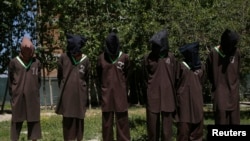Pakistan on Friday rejected as “preposterous” allegations that its spy agency had links with the Haqqani network of militants and played a role in the 2009 suicide attack on a CIA base in eastern Afghanistan.
A newly declassified U.S. document says an officer of Pakistan's Inter-Services Intelligence, or ISI, paid $200,000 to the militant network to carry out the deadly bombing on Forward Operating Base Chapman in the Afghan border province of Khost. It was one of the most serious attacks in the CIA's history, killing seven officers and wounding six others.
“In fact, we were shocked and deeply saddened when precious American lives were lost at the Chapman facility in 2009 in an unfortunate attack that was later claimed by TTP in a publicly available video, featuring the suicide bomber with the leader of the TTP,” said Pakistani Foreign Ministry spokesman Muhammad Nafees Zakaria on Friday.
He was using the acronym TTP for the anti-state Pakistani Taliban that, for years, harbored members of the Afghan Taliban and al-Qaida terrorist network in traditionally volatile tribal areas along the border with Afghanistan.
A Jordanian doctor who was working as a double agent for al-Qaida and the Taliban was blamed, but Thursday's disclosure suggests Pakistan's spy agency and the Haqqani militant network also played key roles in the plot.
The document, obtained by the non-governmental National Security Archive at the George Washington University through a Freedom of Information Act request, was published online with many redactions.
The public portions of the document allege that an unidentified ISI officer provided funds to the Haqqani network and another man "to enable the attack on Chapman."
The plan was for an Afghan border commander to be given $100,000 for his assistance in the suicide mission; but, that commander, named Arghawan in the document, ended up dying in the attack.
The United States has long accused Pakistan of maintaining ties with the Haqqani network, which has been responsible for some of the deadliest attacks against Afghan and foreign troops.
In 2011, the top U.S. military officer called the network "a veritable arm" of the ISI. In 2012, the United States designated the Haqqani network a terrorist organization.
The Pakistani spokesman asserted that, over recent years, his country has "severely damaged and weakened the TTP and other militant and terrorist organizations,” through a series of military operations.
He added that terrorist attacks have killed tens of thousands of innocent lives, including 5,000 security personnel in Pakistan and caused “economic losses to the tune of $100 billion.”




